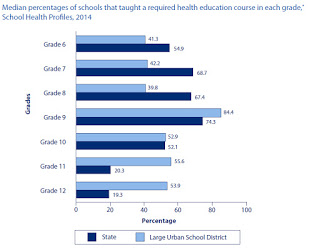Studies conclude that abstinence pledges do little to cut youth sexual activity, pregnancies, sexually transmitted diseases

 Abstinence pledges—sometimes called purity pledges—don’t keep young people from engaging in sex, contracting sexually transmitted diseases or avoiding pregnancy, according to a pair of studies, Denise-Marie Ordway reports for Journalist’s Resource. The main problem is that students are not receiving enough sex education. A federal Centers for Disease Control and Prevention report from December 2015 found that “fewer than half of high schools and only a fifth of middle schools teach all 16 topics recommended by CDC as essential components of sexual health education.”(CDC graphic)
Abstinence pledges—sometimes called purity pledges—don’t keep young people from engaging in sex, contracting sexually transmitted diseases or avoiding pregnancy, according to a pair of studies, Denise-Marie Ordway reports for Journalist’s Resource. The main problem is that students are not receiving enough sex education. A federal Centers for Disease Control and Prevention report from December 2015 found that “fewer than half of high schools and only a fifth of middle schools teach all 16 topics recommended by CDC as essential components of sexual health education.”(CDC graphic)
A 2005 study by Yale and Columbia universities found that 88 percent of youth who take the abstinence pledge engage in pre-marital sex, Ordway writes. “The study found that pledgers were just as likely to get STDs as those who never made a pledge of virginity.”
A more recent study, published in April in the Journal of Marriage and Family, found that among students in grades 7 to 12, “as a whole, young women who did not take abstinence pledges and those who did but broke them were equally likely to acquire HPV, a common STD,” Ordway writes. “Approximately 27 percent of each group tested positive for HPV. Of the young women who had two or more sex partners, pledge breakers were more likely to have HPV. The difference was largest among women who had between six and 10 sex partners. One-third of women who had not taken a pledge and had six to 10 sex partners tested positive for HPV. Meanwhile, 51 percent of pledgers who had six to 10 sex partners acquired HPV. About 30 percent of pledgers and 18 percent of non-pledgers became pregnant within six years after they began having sexual intercourse outside of marriage.”
“In the U.S, the teen pregnancy rate is higher than in any other western industrialized country, according to the CDC,” Ordway writes. “At the same time, a growing number of American teens and young adults have been diagnosed with sexually transmitted diseases (STDs). While individuals aged 15 to 24 make up 27 percent of the U.S. population that is sexually active, the CDC estimates that they account for half of the 20 million new infections occurring annually.”